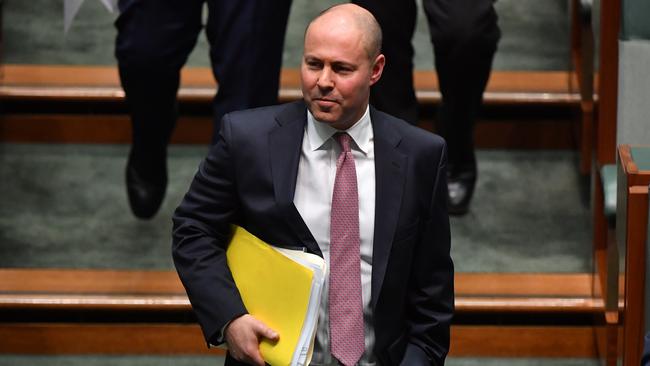Why we won’t see a budget surplus again
Even in a perfect world Treasury is still tipping a budget deficit of at least $40bn in a decade’s time.

Business
Don't miss out on the headlines from Business. Followed categories will be added to My News.
Another budget comes with great fanfare and a lot of leaks to selected accommodating journalists of the ‘goodies’ to be handed out – and then fades rapidly in the rear-view mirror of all your lives.
This one had more leaks than most of recent memory, because it had a lot of ‘goodies’; and no-one likes a ‘good news’ story – even better, successive story after successive ‘good news’ story, dominating radio, TV and newspapers – than an ambitious treasurer.
I’ve certainly seen a few of those over the years: usually the ambition outruns the ability.
But who now remembers even the 2019 budget – the first from Josh Frydenberg – apart from the odd journalist or economist; to say nothing of all the others fading back through the years?
That 2019 budget was the first to predict unending budget surpluses since, well, since Wayne Swan’s “the four years of surpluses, I announce tonight” 2012 effort.
Needless to say we haven’t seen a single surplus since 2007 and – read my lips – will never ever see a surplus again, or indeed even treasurers ‘predicting’ or ‘announcing’ them.
This budget ‘predicts’ we will still have a budget deficit of $40bn to $45bn in 2031-32.
But that’s on the basis of everything going right and I do mean everything – every year.
It assumes that the vaccines will work and work permanently and completely around the world – not only goodbye forever to snap and certainly extended lockdowns, but that the tourists and migrants will come flooding back into Australia and keep flooding, every year without interruption.
Before 2020 nobody thought about having to factor in the potential for a virus to throw the economy into recession and the budget into deep deficit; well, Treasury tells us you don’t have to worry about a second virus doing that anytime through the 2020s.
Treasury also assumes the economy will sail serenely on without even ‘normal’ economic downturns or financial implosions; that China in particular will still underpin our economy and our prosperity.
Treasury also assumes – in a budget where a Treasurer has just splashed around $68bn – that neither the current treasurer nor any future treasurer will initiate a single penny of new spending.
If all those fantasies, all of them, come to pass, we will still have a budget deficit of at least $40bn in 2031-32.
Read my lips again, we will be lucky if it’s as low as $100bn by 2031-32.
One of the key bottom lines of all this is, with apologies to president George Bush senior: read my lips – there will be no tax cuts, anytime through the 2020s, after the one-year one for lower income earners in this budget and the third tranche from the 2019 budget.
The really important event, which is going to play deep into your lives over the next year or two or five was not the budget but the news out of the US that inflation had ‘surprisingly’ spiked up to 4.2 per cent.
The news caused Wall St to drop 2 per cent from its record highs; although in the next days through to Friday’s close the loss was made up and then a bit some.
The inflation was essentially analysed away. It’s a one-off. It was due to unusual factors – like a surge in used car prices (sound familiar?). In any event, the Fed will look through it; that’s to say it won’t snatch away the punchbowl of zero interest rates.
Well, let me suggest: let’s see. You can wish away reality, but you can’t stop it.
Why does US inflation matter to us? In exactly the same way as a virus in China ended up ‘mattering’ to us.
We are just as much hostage to what happens in the US; and what the Fed does and even more does not do about such an inflation ‘event’.
If it raises US rates that will batter Wall St and that will batter our market.
If it does not raise rates – at least not initially or quickly enough – we could see a return to the sort of inflation we saw in the 1970s and which ended up with interest rates well above 10 per cent.
At the very least, that US inflation rate has introduced a new – and totally unexpected as it was totally unpredicted – volatility to what happens on Wall St overnight while you sleep.
We still wake up every morning to an investment world made in America overnight. Once again, it can be ‘made’ just as much by inaction as by people doing stupid things.
A final point on the budget.
We went into the GFC with zero debt thanks to Peter Costello.
We went into the virus with relatively low debt, thanks to the efforts to get the deficit down – and the Costello legacy.
We now head into the future with $1 trillion of debt. Surely, nothing can go wrong?



